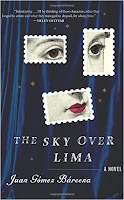They must embellish reality, because in the end that is what poets do, and they are poets, or at least they've dreamed of being poets on many late nights like this one. And that is exactly what they are about to do now: write the most difficult poem of all, one that has no verses but can touch the heart of a true artist.
It starts out as a joke, but then it turns out it's not a joke. One of the two say, almost idly, It would be easier if we were a beautiful woman, then Don Juan Ramón would put his entire soul into answering us, that violet soul of his - and then suddenly he stops, the two young men look at each other a moment, and almost unintentionally the mischief has already been made.
I'm not giving much away to say that they succeed and, for the rest of the novel, are driven to perpetuate the relationship, while being forced to deal with the consequences of manipulating a man's heart. What raises Gómez Bárcena's novel above being a one-trick pony is the self-aware game he plays with the act of writing. The young men must develop the character of Georgina - their young lady - in order to keep the great writer's interest. They tire of letter-writing, realizing that the classic form for full-blooded romance is that of the novel. As they weave the plot and craft the novel's structure, the reader becomes aware that that novel runs parallel with the novel we are reading.
There are times it becomes difficult to separate Gómez Bárcena's enthusiasm for literature from that of his protagonists. He explains his thesis a few too many times:
Do you not also, when you look upon the world, feel that it is made from the stuff of literature.or
"Open your eyes, my friend; love, as you understand it, was invented by literature, just as Goethe gave suicide to the Germans. We don't write novels; novels write us."What separates the author's passion from his protagonists is what he does with it. He constructs layers between the narrative world of the characters, and the one invented by Gómez Bárcena which is far more self-aware. One is the literal distance between the time in which the novel is set - 1904 - and our own. The era is vital to the novel because there is no internet via which one can track down any book one wants. There is no telephone, email, or text. When one corresponds, one writes a letter on a sheet of paper in isolation and waits for a response. Our author clearly maintains a boyish romanticism about this time and its literature, but one thing remains pointedly the same: whether you are writing a letter, texting or, for that matter, blogging, it is through language one creates persona. You may read me believing that I am a man who does theatre or neuroscience and who lives in New York, but, unless you know me, you only believe that because I wrote it. I could be anyone. Secondly, Gómez Bárcena inserts an omniscient point-of view - emphasizing his awareness of the distance between then and now - from time to time.
Carlos stops. To bolster his thesis that everything is literature, that the entire world is a text constructed o words alone, he would like to cite Foucault, Lacan, Derrida. But he cannot, because Derrida and Lacan and Foucault have not yet been born. Actually, Lacan has: he is three years old and currently playing with a jigsaw puzzle - it's morning in Paris - perhaps constructing future memories of what he will one day call the mirror stage. So Carols has nothing else to add.What raises all this above a clever, adolescent game is the way his protagonists, through their prose, come to look at each other and, later, themselves. The game makes the novel amusing, but through it Gómez Bárcena tells a story about creative process. How are writers driven to make what they make? What is the source of narrative in one's self? The novel rises above a merely amusing story because of the insight these two men gain through their actions. So we witness not just the birth of romance but also the death of it. Growing up is a process of gaining self awareness but this novel seems to pose the question, is some of that youthful, naive, playful part of us necessary for the act of creating a work of art?

















No comments:
Post a Comment